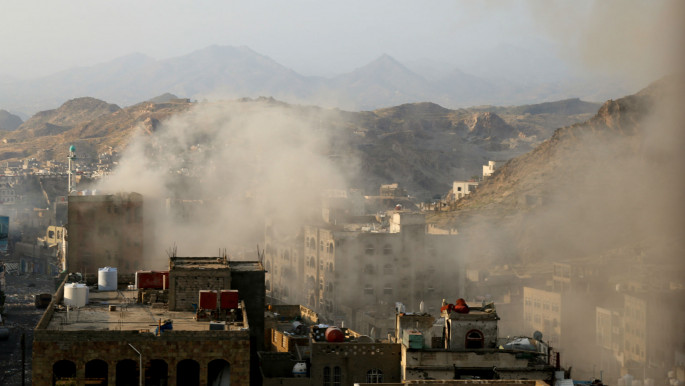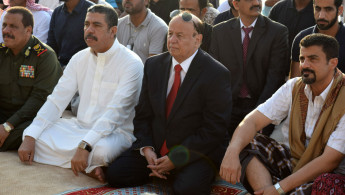Yemen cabinet reshuffle uncovers bitter rivalry between leaders
Yemeni President Abd Rabbo Mansour Hadi reshuffled his cabinet on Tuesday, naming five new ministers, in an attempt to ease raising tensions within his government, according to al-Araby al-Jadeed's Yemen correspondent.
A senior government official however has toldReuters that Prime Minister Khaled Bahah rejected the reshuffle, another sign of the deepening rift between Hadi and Bahah.
 |
|
| Fighting has continued in Taiz province [Getty] |
"A personal announcement will be issued rejecting the ministerial changes because they are illegitimate," the source said, adding that Hadi had made the changes without consulting Bahah, who is also the vice president.
The shake-up comes as pro-government forces struggle to push the Houthi rebels out of the southwestern province of Taiz, which would help retake the capital Sanaa from rebel control.
Abd al-Malek al-Mikhlafi, who leads a team of government peace negotiators, was sworn in as foreign minister, replacing Riad Yassin, the government-run Saba News Agencyreported.
The replacement of Yassin, who is said to have good relations with Hadi but not with Bahah, is understood to be aimed at smoothing relations between the president and the premier.
See Also: Al-Qaeda resurfaces, capturing key southern town from Yemeni government
"The reshuffle is mainly to replace Yassin who had differences with Bahah," a source close to the prime minister said.
Among other changes, General Hussein Arab was appointed interior minister, replacing General Abdo al-Huzeifi who will lead the country's intelligence services.
Hadi also named a new minister of transport, Salah al-Shanfara, who immediately rejected the nomination.
"I am head of the Supreme Council of the Southern Movement and we are in revolution and will not accept [government] positions," he said, referring to the secessionist movement that wants independence for Yemen's south.
The south was independent between the end of British colonial rule in 1967 and its union with the north in 1990.
A secession attempt four years later sparked a brief but bloody civil war that ended with northern forces occupying the region.
Separatists have played a key role in a government-led offensive that has recaptured five southern provinces, including Aden, since July from the Houthi rebels who overran them earlier this year.
A Saudi-led coalition has been backing pro-Hadi forces since March.
Battle for Taiz province
Pro-government forces have faced more fierce resistance in their bid to wrest back control of Taiz province and break a months-long siege of loyalists holed up in its provincial capital.
On Tuesday, clashes raged on between pro-Hadi forces and rebels across the province, al-Araby al-Jadeed's Fares Jalal reported.
Pro-government forces backed by Sudanese soldiers captured three rebel positions in the town of al-Sharija southeast of Taiz city with two soldiers being killed, six civilians were also killed and 22 were wounded in rebel mortar and artillery shelling on residential parts of Taiz city.
Saudi-coalition war planes carried out air raids in the capital Sanaa and the district of Damt in Dalea province on Tuesday.
Hadi, a southerner, returned to Aden last month from exile in Riyadh where he fled in late March as the Houthis closed in.
More than 5,700 people have been killed in the fighting while 82 percent of the population - 21 million people - are in urgent need of aid.





 Follow the Middle East's top stories in English at The New Arab on Google News
Follow the Middle East's top stories in English at The New Arab on Google News

![Israeli forces ordered bombed Gaza's Jabalia, ordering residents to leave [Getty]](/sites/default/files/styles/image_330x185/public/2176418030.jpeg?h=a5f2f23a&itok=_YGZaP1z)
